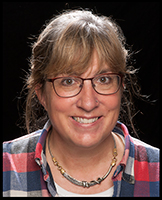Staff profile
Eileen Kerhouant
Marking, Demonstrating, & Teaching Suppo

| Affiliation |
|---|
| Marking, Demonstrating, & Teaching Suppo in the Department of Archaeology |
Biography
With a background in landscape management and sustainability issues, touching on both the environmental and archaeological fields, I have been volunteering with the EAMENA Project (Endangered Archaeology in the Middle East and North Africa) for the past couple of years. This experience led me to Durham University’s Archaeology Department and, in particular, the Informatics Lab, where I discovered like-minded researchers. I’m particularly interested in remote sensing and the integration of results into geographic information systems for further analysis and dissemination to the public. An undergraduate degree in Environmental Studies, combined with an MSc degree in Environment & Development introduced me to landscape issues. A GIS post-baccalaureate certificate and an MSc degree in Archaeological Information Systems honed my interest in the digital aspects of landscape research. Finally, overseas residency in Mayotte, Burundi, Kenya, Uganda, France, Jamaica, Zaire and the UK, with additional intermittent residency in Egypt, provided me with extensive cross-cultural experience and some unique fieldwork opportunities.
Research Topic
As a PhD researcher, I am now exploring how the Historic Landscape Characterisation (HLC) methodology can be applied to landscape research in the Middle East, particularly in Syria. HLC is a Geographic Information Systems (GIS)-based heritage method, originating in the UK, that identifies different landscape components to show the evolution of a particular area through time. By focusing on geographically diverse areas in Syria, I hope to define to what extent HLC can help understand these highly complex palimpsest landscapes (especially given the different historical records available for the different areas). In other words, by stripping away what we know, will the HLC technique facilitate access to prehistoric landscapes? With HLC traditionally being used as a tool for future landscape management, will it be possible to integrate HLC-based research results into future (post-war) heritage management plans? Stay tuned to this space for redefined/targeted research questions as specific study areas are selected for application of this land management technique.

